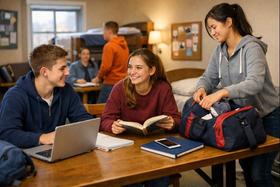Read more details about Trinity College School on their 2026 profile page.
Reflections and Advice:
1.) What do you think makes your school unique relative to other boarding schools?
One aspect that makes Trinity College School (TCS) unique among boarding schools is its strong house system, which creates a small-community atmosphere within a larger school. Each student belongs to a house that includes both day and boarding students, fostering mentorship, friendship, and inter-grade connections. This setup allows students to feel part of a close-knit community while still enjoying the resources and diversity of a larger school. Social, athletic, and academic activities are often organized around these houses, creating opportunities for teamwork, leadership, and meaningful interactions that extend beyond the classroom.Another distinctive feature of TCS is its integration of compulsory extracurricular engagement, which ensures that all students participate in at least one sport and one arts or service activity each year. This approach guarantees a well-rounded experience that balances academics with physical activity, creative expression, and community service. It encourages students to explore new interests, develop leadership skills, and contribute meaningfully to the community, creating a culture where engagement, character, and empathy are as valued as academic success.Together, the house system and structured extracurricular requirements create a unique environment that blends personal growth, community, and holistic development, distinguishing TCS from many other boarding schools.
2.) What was the best thing that happened to you in boarding school?
The most valuable part of TCS for me was the combination of challenge and support. I grew academically, socially, and emotionally, learning independence, resilience, and interpersonal skills.
3.) What might you have done differently during your boarding school experience?
If I could give advice to incoming students, it would be to actively seek connections, take part in a variety of activities, and maintain a positive attitude. TCS taught me that success is not just about grades but also about health, happiness, and engagement with the community. My favorite spot on campus is the school chapel, Trinity House, which symbolizes the history, spirit, and collective identity of the school community.
4.) What did you like most about your school?
I valued TCS’s balance of challenge, support, and inclusivity. The school offered opportunities to excel academically, athletically, and socially, while fostering a caring and structured environment. The house system, diverse activities, and dedicated staff created a strong sense of belonging and community that made TCS feel like home over time.
5.) Do you have any final words of wisdom for visiting or incoming students to your school?
Be open to every experience and take initiative in social, academic, and extracurricular activities. The school rewards engagement, curiosity, and positivity. New students should embrace both challenges and surprises, as they are central to growth at TCS. The chapel and the houses are excellent places to experience the school’s history and spirit.
Academics:
1.) Describe the academics at your school - what did you like most about it?
The academics at TCS were challenging and highly structured, designed to prepare students for future success. Teachers were responsive and approachable, taking time to clarify expectations and provide ongoing feedback. I learned not just subject-specific knowledge but also essential life skills like organization, time management, and study strategies. In particular, teachers emphasized the practical relevance of every topic, ensuring that students understood how lessons could be applied in the real world and in future careers. This approach helped me develop both academically and personally, fostering long-term skills beyond grades alone.
Athletics:
1.) Describe the athletics at your school - what did you like most about it?
Athletics were mandatory and highly organized at TCS, ensuring that all students participated in physical activities. The sports program included field hockey, rowing, and other team sports, providing opportunities for both competitive and recreational play. The emphasis was on skill development, teamwork, and commitment rather than purely on winning. Coaches were supportive and attentive to student well-being, creating a safe and encouraging environment to challenge oneself physically while learning collaboration and perseverance.
Art, Music, and Theatre:
1.) Describe the arts program at your school - what did you like most about it?
TCS offered a strong arts program, including creative service activities, music ensembles, and theatre productions. Participation in arts and service activities was required for all students, ensuring exposure to creative pursuits and community engagement. This integration of arts into school life encouraged expression, creativity, and collaboration. While I participated in arts through service projects like art with the elderly, I appreciated the variety of options available to other students as well, from music to drama, which enriched the school culture.
Extracurricular Opportunities:
1.) Describe the extracurriculars offered at your school - what did you like most about it?
Extracurriculars at TCS were varied and designed to challenge students while fostering community engagement. In addition to sports and arts, students could join service groups, community projects, and other interest-based clubs. The structure encouraged everyone to participate in at least one sport and one arts or service activity per year, ensuring a well-rounded experience. I particularly valued the service opportunities, which allowed me to explore new experiences, develop empathy, and contribute meaningfully to society.
Dorm Life:
1.) Describe the dorm life in your school - what did you like most about it?
Dorm life at TCS was structured and supportive, particularly for international students. Students were divided into houses, which fostered close-knit communities similar to small towns within the larger school. House structures promoted mentorship, friendship, and daily interaction, allowing students to develop strong bonds. While the dorms provided a safe and inclusive environment, some students, especially newcomers, initially needed time to find their social place within these circles. Over time, openness and initiative were key to feeling included.
Dining:
1.) Describe the dining arrangements at your school.
Dining at TCS occurred in communal spaces that encouraged social interaction across grades and houses. The school provided nutritious, balanced meals, and staff regularly checked in with students about their health and well-being. While the review did not provide extensive details on specific food options, the focus on creating a caring and structured environment extended to mealtimes, helping students feel nourished both physically and socially.
Social and Town Life:
1.) Describe the school's town and surrounding area.
TCS is in the quaint town of Port Hope, which provides a charming and safe environment for students. There were local restaurants, shops, and even an art framing studio to explore. While the town is quiet, students were allowed to venture off-campus responsibly when academic or extracurricular commitments permitted. The combination of a peaceful town and the school’s vibrant life allowed students to explore and develop independence in a secure setting.
2.) Describe the social life at your school - what did you like most about it?
Social life at TCS was supportive but required personal initiative, especially for newcomers. Students were generally welcoming, but close friendship circles formed quickly, which meant that new students sometimes had to actively seek connections. The house system encouraged interaction, mentorship, and community engagement, but international students or those new to the school benefited from being proactive in joining activities and reaching out socially. Over time, participation and openness led to meaningful relationships and a strong sense of belonging.
Daily Schedule:
Weekday
7:00 AM
Wake up, morning hygiene, make bed
7:30 AM
Breakfast in dining hall
8:00 AM
Morning assembly / house check-in (optional)
8:30 AM
Classes
10:30 AM
Break / snack
10:45 AM
Classes
12:45 AM
Lunch
1:30 PM
Classes
3:30 PM
Break/Recess
3:45 PM
Extracurricular
Weekend
8:00 AM
Wake up, Breakfast
9:00 AM
Weekend Sport
11:00 AM
Free time / outdoor activities / socializing with friends
12:30 AM
Lunch
1:30 PM
Optional workshops, community service, or study
3:00 PM
Recreational activities (crafts, games, or exploring Port Hope)
5:30 PM
Free time / relaxing in dorms / personal projects
6:00 PM
Dinner
7:00 PM
Evening activities: movie nights, board games, or dorm social events
11:00 PM
Lights out
Read more details about Trinity College School on their 2026 profile page.
Alumni Reviews Review School
Review
Description
My experience at TCS was excellent! I loved the community especially the houses because it really felt like a family away from home. TCS definitely prepared me well for going into university because of the. . .
Trinity College School taught me to always strive to be a better person, both inside and outside the classroom. The school places great emphasis on values, community, and ethics, and these lessons become part of. . .
My time at Trinity was so special. I spent four years there in both day and boarding programs, and I am so grateful for that opportunity. Beyond academic rigour and stellar athletics and arts programs. . .
Show more reviews (2 reviews)
Recent Articles

Hybrid Boarding Models Explained for 2026
Explore hybrid boarding models, including weekday-only, flex boarding, and modular residency, with 2026 insights for families.

Boarding School Student Leadership in Residential Life
Explore how boarding school student leadership builds responsibility through residential life, mentorship, and real-world accountability in 2026.

Boarding School Scholarships & Financial Aid Guide 2026
Updated boarding school financial aid guide for 2026, with costs, scholarship strategies, planning timelines, and expert insights for families.





